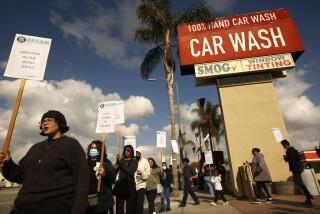Polishing Up the Image at Carwash
- Share via
The proper care of a car means different things to different motorists, but one nearly universal point of agreement seems to be the need--or perhaps urge--to drive a clean car.
Among all the nagging tasks that cars demand, everything from oil changes to brake jobs, the most relentless and time-consuming must be the weekly or monthly task of washing the car. Dirty air or inclement weather only make the job all the harder.
American motorists spent an astounding $2.5 billion at the nation’s 22,000 self-serve and conveyor-type carwashes last year in an effort to keep their wheels in a presentably clean condition, according to the International Carwash Assn. It’s a ritual that keeps 300,000 people employed.
The association reported that the majority of car owners go to carwashes now and then, but also that there is a hardy minority of 39% of motorists who wash their own cars, turning on the garden hose, filling up a bucket with suds and taking a sponge to their sheet metal.
Of course, a good-quality car soap is important to minimize water spots and protect the paint from the harsh chemicals found in many detergents. A semiannual waxing will provide the care that can extend the life of a car’s paint by several years and possibly add hundreds of dollars to the eventual resale value of the car.
But a trip to the carwash, for many, is one of life’s fascinating luxuries, watching the car being hooked up to a conveyor line and towed through various spraying stations, giant spinning brushes and blow-dry machines. Nearly three-fourths of the trips to such carwashes were because of some “special occasion,” motorists said in a survey.
The survey of motorists by the carwash association turned up some interesting statistics. A surprisingly small 4% of motorists never wash their cars, and 22% wash their cars less frequently than once a month, the trade group found.
We might suspect who these people are, who as a matter of money or time cannot wash their cars. And perhaps there is a group that may even take a certain pride in driving the dirtiest car on the road. For them, the possibility that the dirt on their hood might oxidize their paint is a faraway idea or something they might even enjoy.
As a practical matter, a dirty car provides the same sort of transportation that the most polished car does. The carwash association experts suggest, though, that these people might have some deeper problems.
“In psychological research, it has been found that a well-groomed car usually indicates a well-groomed and orderly driver,” according to literature I recently received from the association.
The assertion raises some interesting questions. Does a dirty car suggest the owner is poorly groomed, perhaps with shaggy long hair or dirty blue jeans? Is such a motorist disorderly or even reckless in his driving?
I hope that’s not the case. I recently had the misfortune of parking my own car overnight under a large date palm that was home to a flock of pigeons. By morning, it was literally half-covered with a one-eighth-inch-thick layer of bird droppings. I could not stop at one of the nation’s 22,000 carwashes, so I made the rounds that day with my car in an admittedly disgusting condition.
Everywhere I went, people stopped to look. They were incredulous that such a car was on the road. I wonder whether I had become a disorderly part of society or, at least, whether strangers perceived me as such. That apparently is the power of a dirty car.
At any rate, bird droppings, acid rain and industrial fallout are all harmful to car paint, the association points out. So, even if you are not concerned so much about your image in our image-conscious society, you might have some good reasons to wash your car this weekend.







